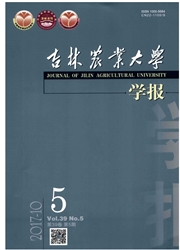

 中文摘要:
中文摘要:
以人参根源愈伤组织为受体,分析了无土栽培条件下收集的人参原生根系分泌物的自毒作用。结果表明:人参根系分泌物可抑制愈伤组织的生长,且随处理浓度增加,抑制活性增强,质量浓度为200 mg/L时,生物量降低56?1%,与对照差异显著;可影响受体抗逆酶活性强弱及变化趋势,短时间或低浓度处理下,酶活性增加,其中超氧化物歧化酶活性增加幅度最大,其次为过氧化物酶和过氧化氢酶,而长时间或中高浓度处理后,酶活性均显著降低,同时3种酶原有的协调作用关系及平衡被破坏。人参原生根系分泌物具有化感自毒活性,对受体抗逆酶系统的显著影响是人参根系分泌物化感活性的重要表现。
 英文摘要:
英文摘要:
The autointoxication of primary root exudates collected by soilless cultivation was analyzed with the natural equivalent of ginseng root callus as receptor. The results showed that:Ginseng root exudates showed inhibitory effects on the growth of callus and the higher the concentration, the stronger the inhibition. Biomass decreased by 56?1% at 200 mg/L, which was significantly different from the control group. Ginseng root exudates could affect the strength and trend of stress?resistant enzyme:the activity of stress?resistant enzyme could increase under short time or low concentration treatments. And the activity of SOD increased by the largest amount, followed by POD and CAT. The activity of stress?resistant enzyme depressed significantly under long time or medium and high concentration treatments. Coordinating functions of stress?resistant enzyme were destroyed. Ginseng primary root exudates had inhibitory effects on the activity of stress?resistant enzyme, which is the important expression for autotoxicity of ginseng primary root exudates.
 同期刊论文项目
同期刊论文项目
 同项目期刊论文
同项目期刊论文
 期刊信息
期刊信息
